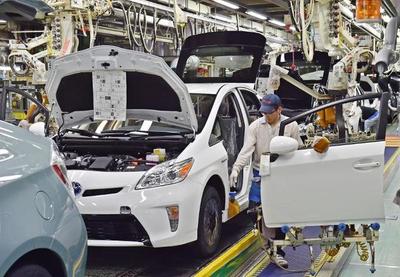Toyota Plans To Ramp Up China Production and Sales
BEIJING 8/17/2018; Reuters reported that Toyota Motor Corp. is likely to make 120,000 more cars a year in the Chinese port city of Tianjin as part of a medium-term strategy that's gathering pace as China-Japan ties improve, said four company insiders with knowledge of the matter.
The Japanese automaker's plan to boost annual production capacity by about a quarter in the port city will lay the foundation to increase sales in China to 2 million vehicles per year, a jump of more than 50 percent, the four sources said.
The Tianjin expansion signals Toyota's willingness to start adding significant manufacturing capacity in China with the possibility of one or two new assembly plants in the world's biggest auto market, the sources said. Light-vehicle imports could also increase, they said.
The move comes at a time when China's trade outlook with the United States appears fraught and uncertain.
Toyota plans to significantly expand sales networks and focus more on electric vehicle technologies as part of the strategy, the sources said, declining to be identified as they are not authorized to speak to the media.
Toyota sold 1.29 million vehicles in China last year and while sales are projected to reach 1.4 million this year, "capacity constraints" have restricted stronger growth, the sources said.
Toyota's manufacturing hub in Tianjin has capacity to produce 510,000 vehicles a year, while Toyota, between two joint ventures, has overall capacity to churn out 1.16 million vehicles a year.
Manufacturing capacity data provided by automakers refer to straight-time capacity without overtime. With overtime, a given assembly plant can produce 20 to 30 percent more than its capacity.
According to two Tianjin government websites last week, Toyota has been given regulatory approval by the municipal government's Development and Reform Commission to pursue an expansion.
The two websites -- including the official website for the Tianjin development district where Toyota's production hub is based -- said the Japanese automaker plans to expand its Tianjin base to be able to manufacture 10,000 electric vehicles and 110,000 plug-in hybrids annually.
It wasn't immediately clear when Toyota will be able to start producing additional vehicles.
A Beijing-based Toyota spokesman declined to comment.
The Tianjin sites, which produce cars such as the Toyota Corolla and Vios, are owned and operated by one of Toyota's joint ventures in China.
The venture with FAW Group Corp. in Tianjin plans to invest 1.76 billion yuan ($257 million) for the expansion, according to the two Tianjin websites.
Historical backlash China is sometimes a difficult market to navigate for Japanese companies for cultural and other reasons.
In 2012, cars sold by Toyota and other Japanese automakers were battered when protests erupted across China after diplomatic spats over disputed islets known as Diaoyu in China and Senkaku in Japan.
Since then, Toyota has emphasized steady growth rather than taking on risky expansion projects.
According to the four sources, Toyota's attitude toward China began changing markedly after an official visit to Japan by Chinese Premier Li Keqiang in May.
During the visit, Li toured Toyota's facilities on the northern island of Hokkaido, and was escorted by Toyota's family scion and CEO, Akio Toyoda.
Toyoda has since sought to boost the company's presence in China, a vision that had culminated in an active effort to identify specific ways to do just that, according to the four sources.
They said aside from boosting capacity, Toyota is also looking at the possibility to significantly expand its distribution networks for the mainstream Toyota and premium Lexus brands.
It wasn't immediately clear how significant a distribution network expansion Toyota is planning for both brands.
Toyota has more than 1,300 stores for the Toyota brand and nearly 190 for its Lexus luxury cars.
The timing for the China expansion couldn't be better.
Earlier this year, Toyota was able to finally launch a couple of much anticipated, potentially high-volume subcompact crossovers -- two China-market versions of the Toyota C-HR crossover which hit showrooms in the United States last year.
The C-HR variants are relatively small crossovers that other manufacturers, most notably Japan's Honda Motor Co., have leveraged to expand sales rapidly and sell more vehicles in China than its much bigger rival Toyota. Honda sold 1.44 million vehicles in China last year.
Lexus is also expected to benefit from a windfall from growing trade tensions between China and the United States.
In retaliation for U.S. trade actions, China raised tariffs on automobiles imported from the United States in early July to 40 percent, which, among other things, has forced Tesla Inc., BMW, as well as Daimler AG's Mercedes-Benz to raise prices on certain U.S.-built vehicles, such as the hot-selling BMW X5 and X6 SUVs.
One likely consequence for those brands is lower sales, a squeeze on profits, or both.
By contrast, all Lexus cars Toyota sells in China are brought in from Japan and benefit from a much lower tariff rate of 15 percent levied on non-U.S. produced car imports.



